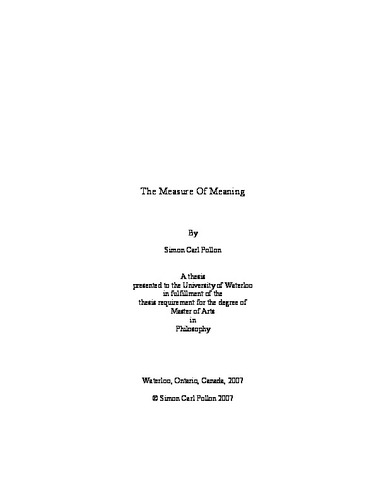UWSpace will be migrating to a new version of its software from July 29th to August 1st. UWSpace will be offline for all UW community members during this time.
The Measure Of Meaning
Abstract
There exists a broad inclination among those who theorize about mental representation to assume that the meanings of linguistic units, like words, are going to be identical to, and work exactly like, mental representations, such as concepts. This has the effect of many theorists applying facts that seem to have been discovered about the meanings of linguistic units to mental representations. This is especially so for causal theories of content, which will be the primary exemplars here. It is the contention of this essay that this approach is mistaken. The influence of thinking about language and mental representation in this way has resulted in the adoption of certain positions by a broad swathe of theorists to the effect that the content of a concept is identical to the property in the world that the concept represents, and that because of this a concept only applies to an object in the world or it does not. The consequences of such commitments are what appear to be insoluble problems that arise when trying to account for, or explain, misrepresentation in cognitive systems. This essay presents the position that in order to actually account for misrepresentation, conceptual content must be understood as being very much like measurements, in that the application of a content to an object in the world is akin to measuring said object, and that conceptual content ought be understood as being graded in the same way that measurements are. On this view, then, concepts are the kinds of things that can be applied more, or less, accurately to particular objects in the world, and so are not identical to whatever it is that they represent.
Collections
Cite this version of the work
Simon Carl Pollon
(2007).
The Measure Of Meaning. UWSpace.
http://hdl.handle.net/10012/3336
Other formats
Related items
Showing items related by title, author, creator and subject.
-
Geochemical and microbiological characterization of effluent and pore water from low-sulfide content waste rock
Bailey, Brenda Lee (University of Waterloo, 2013-04-22)Laboratory and field studies were completed to characterize the geochemistry and microbiology of drainage emanating from low-S content waste-rock test piles at the Diavik Diamond Mine (Diavik) from 2007 through 2010. The ... -
Examination of sex differences in quadriceps fatigability and Hsp70 content in response to intense intermittent isometric exercise
Hopf, Andrew (University of Waterloo, 2009-09-30)The purpose of this study was to determine if there are sex differences in induced heat shock protein 70 (Hsp70) expression in human skeletal muscle under basal conditions and in response to intense intermittent isometric ... -
Exploiting the Computational Power of Ternary Content Addressable Memory
Tirdad, Kamran (University of Waterloo, 2011-09-30)Ternary Content Addressable Memory or in short TCAM is a special type of memory that can execute a certain set of operations in parallel on all of its words. Because of power consumption and relatively small storage ...

